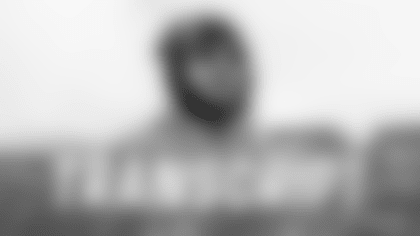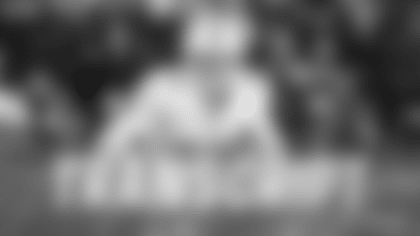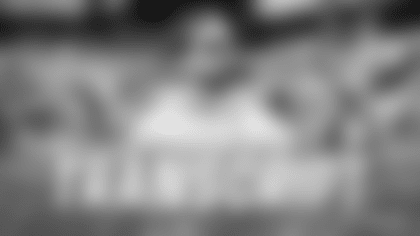Read the full transcript from Head Coach Mike McDaniel's press conference on July 23, 2025.
Q: Three guys I was going to hit on – with OL Liam Eichenberg and S Ifeatu Melifonwu, would you expect them back by the regular season? And then DT Zach Sieler – do you expect him to practice this week? I know his agent had left that open.
"We've got a two-parter. We'll get to the second one because I've got to focus, man. (laughter) Your first question was on two players. So Liam (Eichenberg) is weeks – what is that, regular season? I'm not going to put a timeline on it and I wouldn't bet against arguably as tough of a player as I've been around. He's played in football games that a majority of players that I've coached wouldn't be able to, so I'm feeling good about an unknown timeline because of the player. But I don't – it's not like a season-ender or anything like that. Now 'Iffy' (Ifeatu Melifonwu) was the next – I would say it's nothing that I'm worried about and it's rooted in a good amount of preventative nature. Cool? Then what else have we got?"
Q: And DT Zach Sieler, if you and him have talked, if he's going to practice and what you're able to share from those conversations?)
"He's going to play football. He's an absolute stud. Excited for every day that he's on our team and him participating with the team. I am expecting him to play football. I don't do it out of any disrespect, but I don't articulate on and proliferate on business because that's an opportunity cost. It takes my focus away from football and that would be bad leadership, my friend."
Q: This normally wouldn't be a question I would ask, but given how S Minkah Fitzpatrick left here, I wondered at the time of the trade and I still wonder, did the organization reach out to him either directly or indirectly with the Steelers' approval to see how he would feel about coming back to Miami?)
"Thanks for the approval part because of tampering, all that stuff. I think as you enter into negotiations of any sort of trade, you try to identify first and foremost that the player you're receiving wants to play football for you. So whatever that means, we are excited. I'm elated to add Minkah (Fitzpatrick) to the team because it's an opportunity to have a player that I've been coaching off of and plays the position the way that we here want to play the position, that he gets to actually play the position. It's a real good fit based on his skill set both athletically and what he's able to do with his transitions in the open field and then elite ball skills. And then leadership, it was something that – you know, the National Football League is hard, especially when you're a guy like Minkah that puts everything into it. So there's a lot of things that go on when you're all in with a team and then your team changes. That being said, you're a football-first guy that wants to be around teammates that care about football and you're driven to win and write your own story. I was very confident this would be a place that he would fit right in. Know a lot of Bama guys, know a lot of guys in NFL, so had a lot of foresight into what the what he was coming back to, and shoot, he couldn't get in the No. 29 jersey fast enough."
Q: Yesterday WR Tyreek Hill said that he's matured a lot this offseason, but he also mentioned that you've matured a lot. Has there been a different approach that you've taken towards the players as you get ready for a new season?)
"I've kind of talked about this. It's hard to totally paint the picture, but like, inherent to my entire life is assumed improvement, development and growth. That's how one goes from on the outside looking in to figuring out a way to follow your dreams. So in that, my expectation for myself is that I'm never a finished product and that you're always learning from life because you're gifted each and every day and you're trying to seize each one of them, the better version of yourself. So I absolutely agree with Tyreek Hill in that he has had some very, very real reflection, and up until this point today, all he's shown me is relentless commitment to dictating the conversation moving forward based on being who he wants to be as a father and a leader of the team. Myself, I can't expect players to develop for me. I don't see a world where I can reliably expect people to develop if I'm not developing myself so results don't – regardless, winning season, losing season – my expectation is that the team is getting a better version of myself, and I demand a steady evolution for everybody involved, including the fan base and you sweet, sweet reporters."
Q: How does gaining S Minkah Fitzpatrick and deleting Jalen Ramsey impact what you have in the secondary?
"So here's the thing with human beings – each and every one, like fingerprints, are unique, so you change any sort of combination and it's going to be different. I think Jalen Ramsey is a Steeler. I like to talk about Dolphins. Minkah Fitzpatrick is a Dolphin. I'm super pumped about his specific skill set and what motivates him and how he can affect his teammates. Everything – right, wrong or indifferent – is pretty consistent with me. My devotion to do the best thing for the team will never change. We are trying to win football games, and each and every day, we are trying to earn the right to be in that win column and we have a lot of lunch pail, day-by-day, hour-by-hour, meeting-by-meeting, practice-by-practice, to have our say in the results, but until then, we are busy at work."
Q: What did Q B Tua Tagovailoa tell you about S Minkah Fitzpatrick?)
"He told me his first on-field impression, which was hilarious. As a freshman, they're running gassers at the end of the practice, and they're gutted. And as a freshman, you have a bunch of peers, upperclassmen that you're trying to prove yourself towards and then Minkah – just this silent dude in meeting rooms, just all sudden, blacks out – starts talking about overtime and talking all sorts of – not a bad word but stuff, Ayla (laughter) – all sorts of that and pushing his entire team and Tua was like, 'Who is this psychopath? I fear him.' First day on the job. Before any practice, before, you've got to condition. You've got to see where people are at and it took one team moment for him to feel his impact. So that was a cool story because it was one of his first memories as a college football participant. They weren't playing football, it was just conditioning, but I think it speaks to the type of impact that a player who reserves his (words) – he's a soft-spoken guy – but he plays the game the way we envision playing it."
Q: Are you still looking to add one of the top remaining free agent cornerbacks?
"Are we resisting getting better? We are not resisting getting better, but the key part of any sort of roster addition, subtraction, anything; is getting better. I understand completely there is a lot of tweets, words, articles for people that care about the Dolphins about a position that it will never change – if you have youth at a position that's developing and you're developing it and you have confidence in it, you're going to have confidence in it before the people that haven't seen it do. So we're confident in the group. That being said, not closing the door for anything. There's multiple players we talk about each and every day, but we're also very excited with some guys that have a lot to prove and know that and are excited about the opportunity."
Q: I know you joke about beating traffic, getting here at 8 o'clock, but what was the actual thought process in moving practice times up from where it's been in the past?)
"I was bored. (laughter) No, there's a lot of reasons that are very specific to this particular team and this particular training camp. You get used to a ramp up period in reps and stuff and being able to do that and really in the most vulnerable portion of camp, try to minimize some soft-tissue a little bit. Maybe avoid some days where you've having to stop practice in the middle of things and go from grass cleats onto turf, weather stuff and then we also have some challenging things that I'm factoring in moving forward within the preseason where we're going on the road and spending some time away and having some joint practices and several competitive physical practices and games in a 10-day period, so we need all hands on deck. And then by that point where we've gone on the road and we come back to Florida, we'll adjust to time, keep things fresh and compete against the heat as we always do. So a lot of things at play. It was very, very thought out and I'm excited for the lack of traffic. You're welcome. (laughter)"
Q: What do you like about OL Daniel Brunskill and how valuable is that experience that he has playing with you for four years back in San Francisco?)
"It's cool to have relationships with players where you're fortunate enough to really see the whole journey and with (Daniel) Brunskill in particular, I remember watching – there was a league that he was playing in that wasn't college and it wasn't the NFL and it escapes me right now, but don't judge me – and I got to watch him be a new guy on the team and earn a roster spot with nothing promised. And then to watch him develop his game so that he could start in the National Football League and have a real career at several positions, it's cool to add a guy that you get to be part of the process. So what we're getting is a guy that not only helps the offensive line, but helps the whole team, and the more guys you add that are really focused on being a part of a winning football team and prioritize that over everything else, the strength of the masses is real. I know one thing from Dan Brunskill is the dude is going to be over-prepared, competitive. He's assuming right now that you guys have nothing good to say about him, and he's going to work to prove you otherwise. That's how he operates and that's a mentality I think is important in the NFL."
Q: Now your fourth year as a head coach, how does your view on natural talent versus deliberate development fall?)
"Entering the whole deal, I read the book 'Talent Is Overrated' maybe in 2012 or 2013 and first was exposed to deliberate practice and have been looking through the lens of coaching through that nature. So I had a tremendous regard for that going into being a head coach because quite honestly if you're around me, I owned about 70 percent of the phrase 'deliberate practice' with 30 percent other people their whole lives ever saying it. So I was saying it a lot and I believed in it. Having said that, as a head coach, I'm more of a believer. Just because you are more privy and you really feel the team, the nucleus of the team and how people's habits affect other people, how there's all the pressures along the entire field of people trying to perform, and the only way to get the results that you really, really are trying to manifest is that you put yourself in the closest thing to that situation. I always believed that, but in practice, I've watched it and I think this team has a firm understanding of what that is based on the spring because you learn that anything that's good in athletics is a product of deliberate practice, quite literally."
Q: Yesterday WR Tyreek Hill said that he hasn't been giving the best version of himself his entire career. I'm curious was that self-reflection of his point that he shared with you or was that something you guys spoke about together?
"Absolutely. He's been within this building – you can see thus far, the three months that the team has been working at it, that he's saying that publicly. Why do I say that? Because he's come to work every day with vigor and determination. I think first and foremost, the only way that you can dictate the terms in life, is you have to take a realistic evaluation of what's going on and if you're not happy with certain things you have to put in the work to change it. I think the whole point – if I can affect the team and the players on it in any way – the one thing that I think is ever-pervasive is adversity is adversity. You have the choice of making it an opportunity or whatever you don't like about it, you can live that into existence. So humble, accountable, deliberate, intentional daily focus; that's what we're looking for and I'm excited for him to get another opportunity to stack another day today, which is Wednesday, Practice 1."
Q: What were your initial thoughts about the addition of TE Darren Waller?
"A lot of positive thoughts. I was very happy just because I feel like I know a lot about Darren (Waller) based on my relationship with Frank (Smith) and how big a part they played in each other's careers. And I know one thing – life is not about avoiding trauma or problems. I think the opportunity to have a player that is hungry, that is healthy in mind, body and spirit and wants to do something for reasons that you know are appropriate based on he has had time to reflect, I couldn't be happier to having a guy that just walks in the door as a daily inspiration because a lot of people have problems. Typically people that he's shared problems with, we're not talking about in a press conference. A lot of people hide from things. He doesn't. He's already built relationships within the team, which doesn't surprise me, and I was pumped that the Miami Dolphins had the opportunity for him to put the finishing touches on his career here."
Q: Is it more of a bunker mentality than previous teams? When LB Bradley Chubb and FB Alec Ingold talked yesterday, Chubb shared the "they talk, we do" thing that he said you've told them. Alec Ingold said I don't give a "bleep" what other people think. Is there more of a bunker mentality with this team and does that matter in wins and losses?
"No, I think there's clarity in people really caring and you have a team that minus the last game of the season, finishes in a very frustrating season 6-2 and I think I tried my best to paint a clear picture of what their expectations should be on what the stuff they're going to hear until we play games again. And instead of fighting stuff that's based on stuff you can't control, understanding that the only thing we can do is the daily investment into each other. There's a supreme clarity of focus of what matters and what doesn't, I think. You want to avoid stuff a lot and it sucks when teams have to learn lessons – it just sucks even more if those lessons are in vain. What can you do? Well, you can learn from lessons. We were over talking because what is there to talk about? We have to do work and it's about today and what does that mean? It means today we give ourselves an opportunity to build upon the last time we practiced, the whole offseason and maybe set ourselves up for the opportunity of something cool to improve upon the next day. But beyond that, I think it's maturity, the leaders are wise and they're driven to do stuff today that everybody's very well-versed in. No one's going to care about what we do today. I think there's power in understanding the reality as the world we live in and I'm thankful that for guys like Bradley Chubb and Alec Ingold, that's why you're in it because they're trying to affect change and everything they're telling you, it's because they believe with their soul and we've got a lot of purposeful people. We'll see what happens. If you guys have to buy tickets, I'd buy a ticket for practice. It'll be fun."
Q: The Dolphins have one of the youngest rosters in the NFL, the Dolphins had one of the oldest rosters in the NFL last year. How do you navigate the change?
"I guess it's by nature what my job is in that I am adjusting. I'm not like, hammering home, 'All right, this is who I am. I'm not going to care about the listener and adjust.' I'm always adjusting to the listener because my job is to reach the listener and produce the best product. There's different conversations when your team's overall average age changes, but a conversation needs to be had with both parties regardless. It's just a different conversation. I think you have to be very aware of your audience to give them the proper leadership, know what to focus on and know what they don't need to hear or is too much. It's been an exciting process because I think we have a lot of young guys that are embracing the tutelage from the older veterans and there's a team component of recognition of 'Hey, I don't care how it happens, if everybody gets better, we're all closer to what we're trying to do anyway.'"
Q: You talk about such learned lessons, but going into Year 4 is there one or two you learned from the last year or two that stand out that you're carrying into this season?
"I guess I look at it is my challenge and where my competitive spirit comes out is I look at – my job and our team's job is to beat people in the lesson learning game. Like I'm not running – let's be overly accountable and let's hold each other accountable and identify what isn't good enough and fix it, as opposed to running from nonsense. I like where our team is at today and you're going to be able to copy/paste this in a tweet and I'm excited to see what happens tomorrow."
Q: Some new faces offensively this year and earlier in the spring you mentioned that QB Tua Tagovailoa is working on his consistency of the mastery of the offense. In your mind how do you walk the line of balancing those two things and how can those two dynamics help one another?
"It's an interesting question because the hardest part in developing rapport with a receiver and a quarterback – for instance, you have a route that's run, a throw and it's incomplete. Well, it's the why is that incomplete; if you don't establish the why, well, the quarterback is going to change what he did, the receiver will change what he did and you won't have connectivity. You need to know and have an understanding of the whys of everything. Once you establish that, then you can get into the finer nuances of tailoring your game to the specific player. For Tua, who has unbelievable ball placement, he can get more confident throwing lower to one guy, higher to another and feeling a guy's body movement and all that. But the tricky part is not over-correcting on both sides by result. You have to have a coaching staff and players that understand what you're asking of them so that when there's failure, there's not overcorrection in the wrong way and that comes with trust and guys getting used to – I really don't get upset if there's an incompletion on Day 1; I get upset if guys weren't prepared to execute the play and no one got the look to even see if it was a completion or an incompletion. I think that you just hit a nail on something that you can extrapolate that to all units that are working together in football. You have 11 people trying to work as one and in that process, you can't just be result-based; you have to dig a little deeper."
Q: What led to TE Darren Waller being put on the PUP list?
"You didn't know my standard procedure for out of retirement players? (laughter) You're trying to be responsible. There's no gravity to it. It's just that this is a very well-conditioned athlete who's in great shape. There's a zero to 60 element in science, in general that you try to avoid, and so being preventative and responsible as he gets his feet wet, that was our motivation and excited to not be mad at myself on Day 2 when I was like, 'what am I doing?'"














